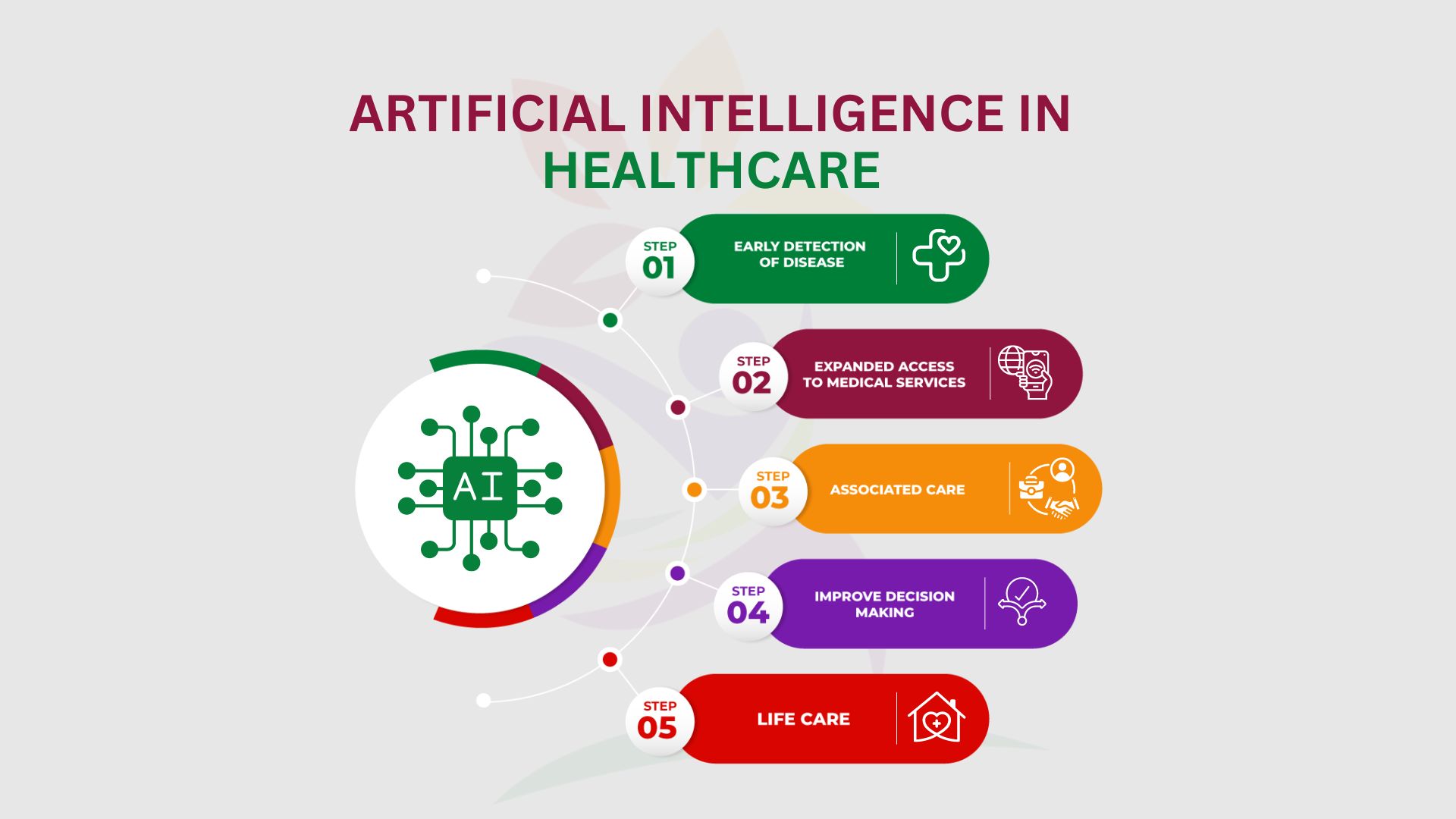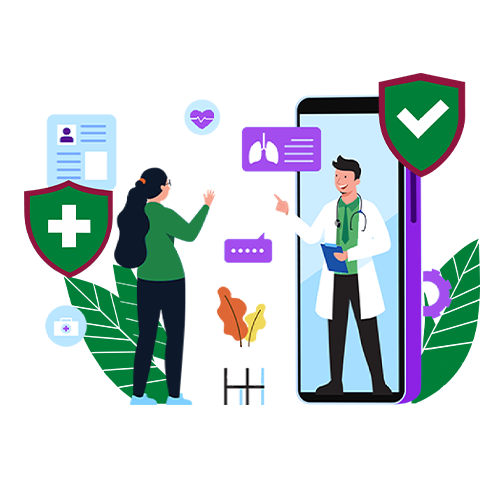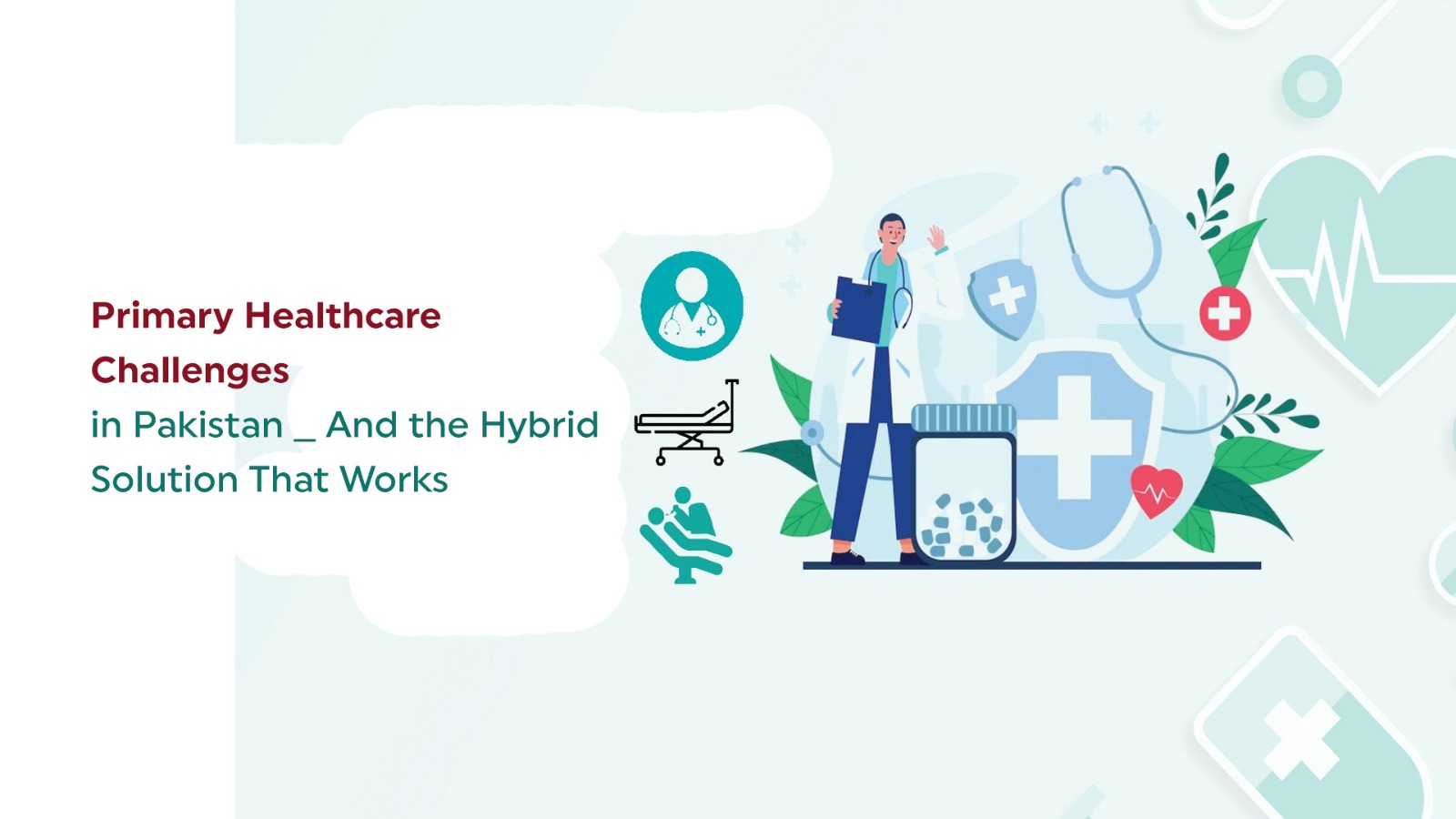Artificial Intelligence is revolutionizing healthcare. It is extensively used currently in healthcare services like patient care, accurate diagnosis, and efficient treatment. Artificial Intelligence is the future of healthcare since it is enhancing patient care, reducing cost, and improving reliability. Integrating AI in hospitals and clinics, can make the patient journey easier, faster, and smarter even for millions of people worldwide. Research by Harvard and McKinsey shows that AI can save up to $360 billion annually.
The major difference between conventional healthcare and AI healthcare is that AI gathers a large amount of data and processes it in a more defined way. Integrating AI in clinics can advance healthcare sectors. For this purpose, healthcare providers should have proper knowledge of using AI tools.
In this article, we will explore how AI is transforming dramatically healthcare systems, its pros and cons, and the future scope of AI.
Quick Links
ToggleHistory Of Artificial Intelligence
Christopher Strachey first developed the AI program in 1951. Then in 1956, John McCarthy coined this term. In the 1960s and 1970s, AI research was based on expert rule-based systems in computing data.
In the 1980s and 1990s, AI moved towards neural networks in which machines can learn provided data and make it better. During this period, IBM developed the Blue System, the first chess-playing computer to defeat world chess champion Garry Kasparov in 1997.
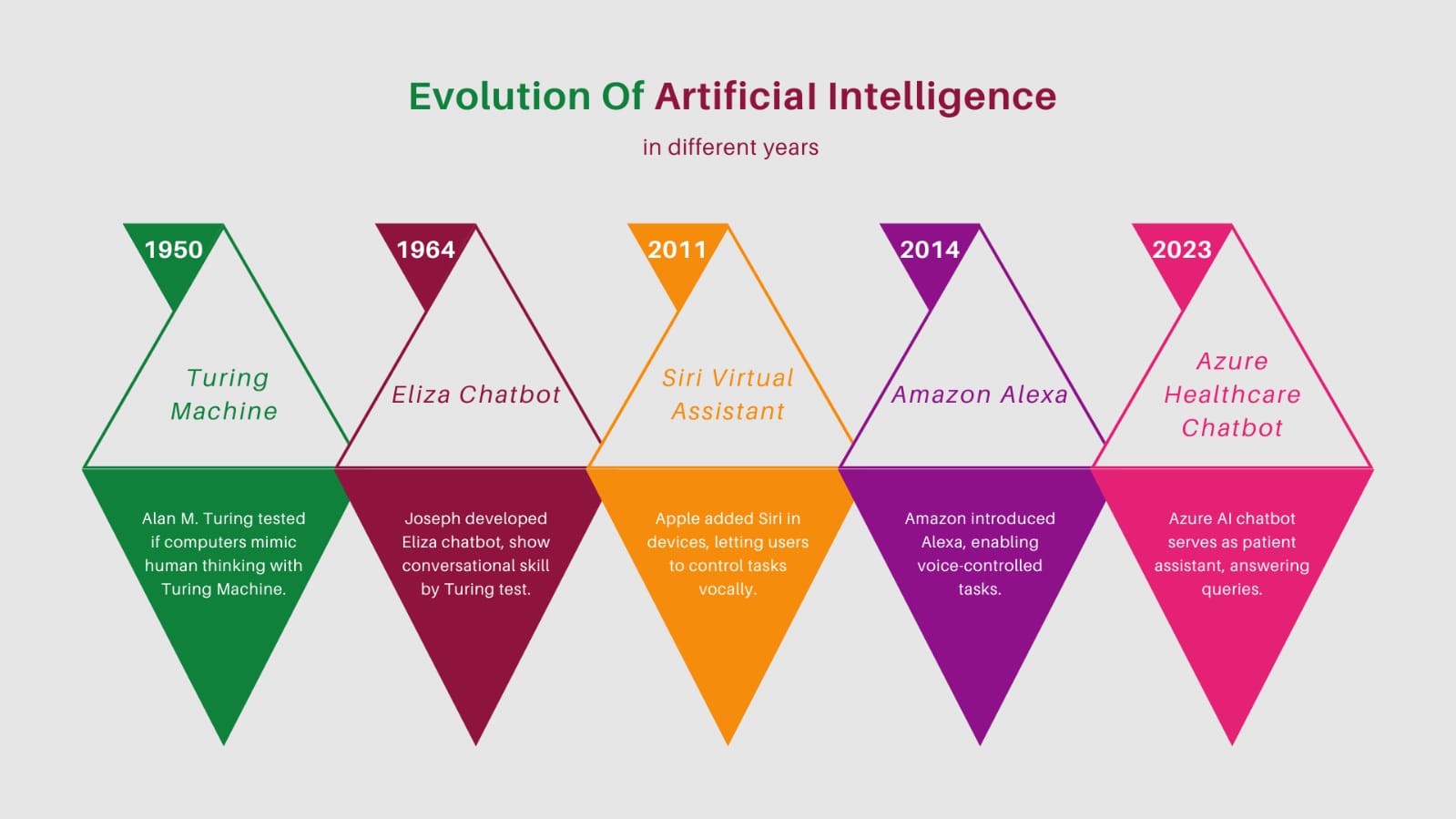
Advancements in Artificial Intelligence continued and in the 2000s, virtual assistants were developed like Apple’s Siri and Alexa which were developed on a technology by which they can understand natural languages and respond and perform actions according to them. Statista reported that the AI market worth was $11 billion in 2021 which will be approximately $180 in 2030. In 2002, The Roomba Learners vacuum cleaner, a robotic device, was introduced to autonomously clean homes, revolutionizing household cleaning.
| Year | Development | Description |
| 1950 | Turing machine | Alan M. Turing conducted the Turing Machine Test to determine if computers could mimic human thought processes. |
| 1964 | Eliza Chatbot | Joseph Weizenbaum developed the first chatbot, Eliza, which successfully passed the Turing Test, demonstrating conversational abilities. |
| 1997 | IBM’s Deep Blue computer | IBM’s Deep Blue computer defeated chess champion Garry Kasparov, showcasing advancements in artificial intelligence and gaming technology. |
| 2002 | Roomba vacuum cleaner | The Roomba Learners vacuum cleaner, a robotic device, was introduced to autonomously clean homes, revolutionizing household cleaning. |
| 2011 | Siri virtual assistant | Apple integrated Siri, an intelligent virtual assistant, into its devices, allowing users to perform tasks using voice commands. |
| 2014 | Amazon Alexa | Amazon launched Alexa, a virtual assistant, that enables users to complete various tasks, including shopping, through voice interaction. |
| 2023 | Azure healthcare chatbot | The Azure healthcare chatbot, developed using artificial intelligence, serves as a patient assistant, answering queries and providing support. |
Uses of Artificial Intelligence
Artificial Intelligence is widely used in healthcare, finance, industries, and academics in various ways. Here are a few practical applications of AI.
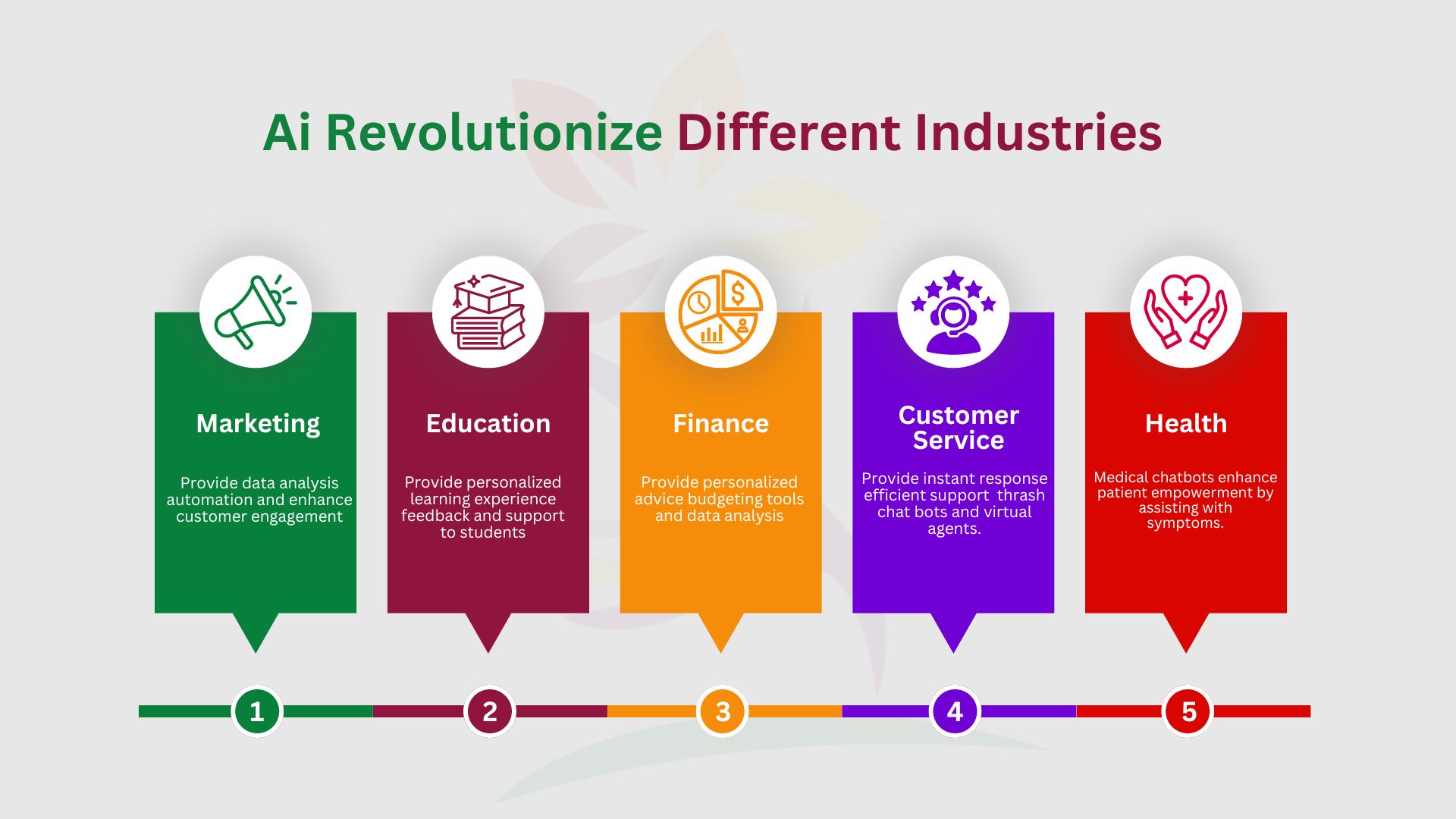
Uses in the Medical Field
Here are the following common uses of AI in healthcare.
| Field | Description |
| Cardiovascular | AI technologies in cardiovascular diseases utilize wearable gadgets and smartphones to detect and monitor heartbeats and valvular diseases early. They also assist in medication management and adverse effects monitoring based on patient needs. |
| Dermatology | AI, particularly deep learning and CNN improve skin disease diagnosis, including skin cancer and melanoma, surpassing dermatologists in accuracy. Utilizing micro and macro images, AI achieves 86.6% greater accuracy in detecting skin cancer. |
| Infectious diseases | AI aids in identifying and predicting infectious diseases like sepsis, meningitis, and tuberculosis in clinics and labs. With investments reaching $2 billion by 2025, the US employs AI, notably during COVID-19, with $463 million spent on research. |
| Oncology | AI excels in early cancer cell detection, particularly in breast and prostate cancer. Studies indicate AI outperforms radiologists in accuracy. Notably, AI achieved heightened accuracy in grading retroperitoneal sarcoma aggressiveness in 2023. |
| Neurology | AI assists in Alzheimer’s disease detection and diagnosis through MRI interpretation. Employing Generative Adversarial Network in deep learning, AI forecasts Alzheimer’s disease progression. |
| Pharmacy | AI transforms pharmacy practices, aiding in patient treatment, medication management, and disease prevention. With technology, machines manufacture medicines, formulate treatment plans, and enhance patient care services. |
Uses of AI in Healthcare
1- Disease diagnosis Technologies
Bayesian networks (BAN), and Artificial neural networks AI technologies are used for disease diagnosis, classification, and reasoning. ANN is used for diabetes and cardiovascular diseases while BAN is used for Alzheimer’s and dementia diseases forecasting at an early age. Artificial intelligence-based technologies can interpret, diagnose, and treat patients more accurately as compared to doctors AI can also handle similar cases by asking appropriate questions from patients. In this way, it makes the patient’s journey smooth and easier.
2- Telemedicine and Telehealth
AI has also transformed remote monitoring of patients. A patient from any area can get the best medication services. By using wearable tech gadgets AI also enables patients to track their health on their own and get remote doctors for consultations and telehealth.
AI-developed smart gadgets like sensors and wearables can detect even a minor change in the patient’s body which is generally not distinguishable by human beings. AI is also helpful for taking good care of older people. Personal and environmental sensors are now available that can detect change and an alert goes to a physician. Bride these different chatbots are also available nowadays which can answer patient’s queries more accurately according to their needs.
3- Using Electronic Health Record Data
With its ability to process massive amounts of clinical data with high accuracy, artificial intelligence is completely changing the healthcare sector. AI helps doctors treat patients more efficiently, save costs, improve speech recognition software, and practice precision medicine. 80% of clinics are using EHR to digitalize their systems. By using NLP AI can identify different reports precisely.
AI can also find data and medical history if the patient is already present in its record. 70-72% of EHR data is accurate. By using rule rule-based system AI can also observe patients, diagnose and treat patients well, and save time. AI can also help doctors maintain a lot of health records online and treat patients by using AI assistants.
4- Increasing Patient Safety: Drug Interaction Identification
Artificial Intelligence is also used for drug interaction identifications. Taking different medicines at a time puts a patient’s life at risk.
For this purpose, different AI-generated systems are developed that can identify drug interaction by using provided information in their systems and also be aware of all possible adverse effects of that interaction. The FDA Adverse Event Reporting systems and World Health Organization (WHO) also help to identify different AI-provided drug interaction content like EHR.
Tech Companies Investments in AI Healthcare Solutions
Different healthcare industries are also using Artificial Intelligence. These industries mainly use AI for clinical decision support systems. Companies are investing in incorporating big data in healthcare. These companies use data assessment, management, and data storage that play key roles in healthcare industries. The following companies are using AI in healthcare sectors.
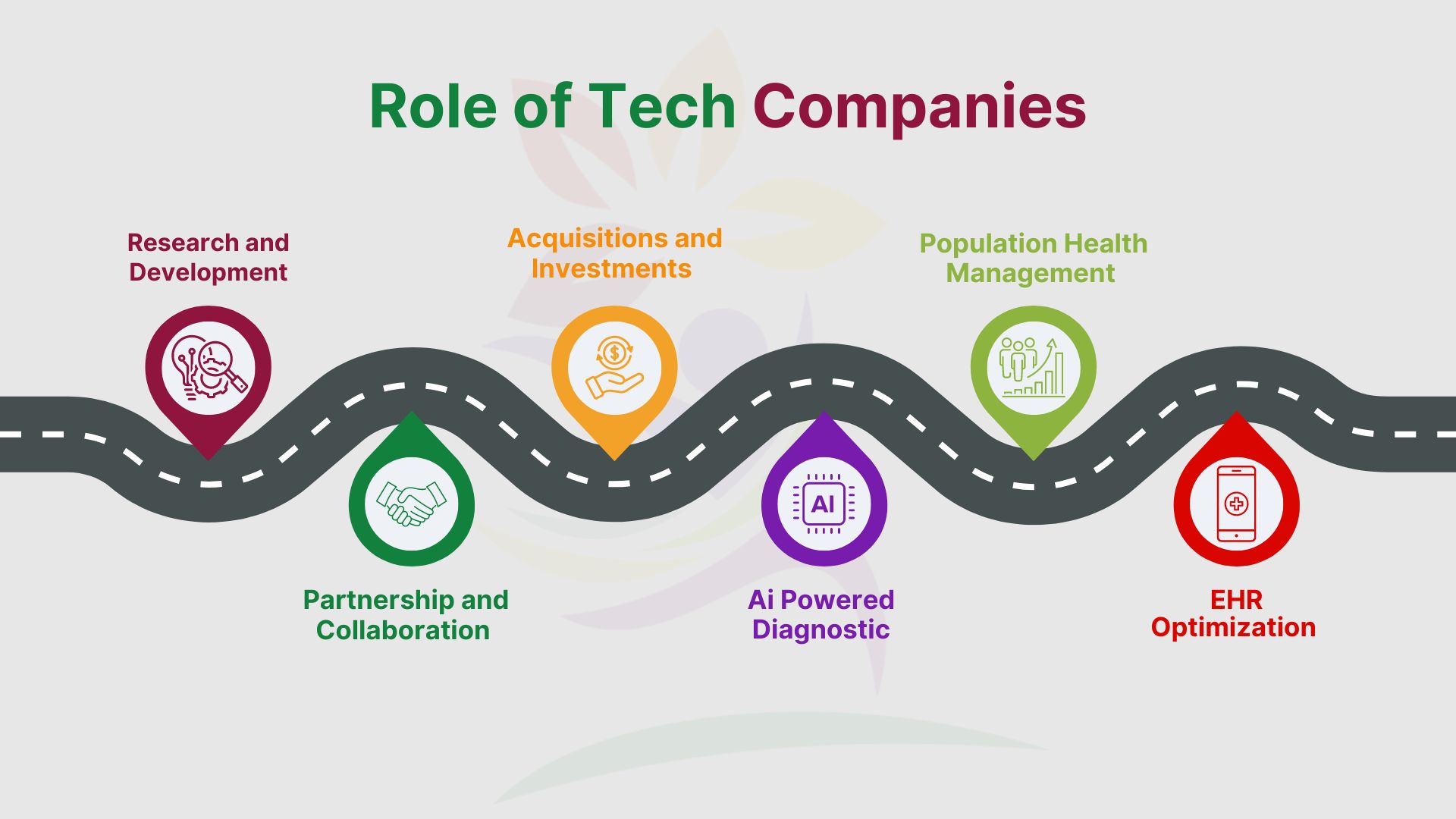
- Microsoft’s Hanover Project in collaboration with Oregon Health and Science University is working on research on cancer to diagnose and produce effective medicine for cancer treatment.
- Google’s Deep Mind is used by the UK National Health Service to identify health issues using data provided through mobile apps. NHS is also working on image analysis through data stored to identify cancerous cells.
- IBM’s Watson also works with Memorial Sloan Kettering Cancer Center, Cleveland, and CSV Health to identify and diagnose chronic diseases.
- Neuralink came up with more advanced technology. It is a chip inserted in the brain’s skull to connect with thousands of neural pathways. It will prevent any accidental injury.
In addition to this, various online apps based on AI are available for medical consultation. These apps have common data stored in them to diagnose, and treat patients. Many entrepreneurs are also investing in the healthcare industry. Different chatbots have also been developed that will answer about dead people in the coronavirus. As AI is advancing day by day different tech companies like Amazon, Google, Apple, Baidu, BMW, GE, Tesla, Toyota, and Valvo all are investing millions of dollars to get smart AI in healthcare and expand their companies.
Smart Virtual Clinics for Developing Areas
As AI continues to expand it will also continue to help people in healthcare. There are many areas where there are only a few doctors available and internet services are unavailable AI is building remote clinics for patients to get the best services even from far underdeveloped areas.
For this purpose, SpaceX and Raspberry Pi Foundation are working on providing computers and internet to backward areas. It will enable people to get more effective medication services in the comfort of their homes.
Ai Healthcare in Pakistan
AI is changing healthcare in Pakistan, improving diagnostics and expanding access through telemedicine. Its predictive analytics enhance early disease detection. Wider adoption is needed, and AI can democratize healthcare by empowering marginalized communities with personalized care.
AI not only helps patients get basic medication services but also enhances patient user experience by getting the best treatment. The largest AI healthcare network in Pakistan, Fitwell Hub, is actively pursuing this model. They also provide virtual healthcare services to their patients from the best physicians in Pakistan as well as from foreign physicians.
Protecting Patient Privacy: Regulatory Concerns of AI in Healthcare:
The Health Insurance Portability and Accountability Act (HIPAA) and the General Data Protection Regulation (GDPR) are laws for data protection in healthcare centers. These laws protect patients’ privacy and deal with any legal data risk issues with the help of AI. A survey in the UK showed that about 63% of people are reluctant to share their data with healthcare sectors that integrate with AI. As AI used in healthcare sectors shares patients’ legal data and information with different apps and companies it should be prioritised to protect the data of patients from any cyber attack.
Uses of AI in Various Fields as an Assistant:
A survey report in 2023 showed that all business owners, doctors, patients, and other people are afraid of AI. A study in 2019 showed that AI will replace 35% of jobholders in the next 10-20 years. But AI couldn’t do so far. However, this automation can work better for doctors in assisting them to deal with patients more effectively if they have enough knowledge of using AI technologies.
So we need to upgrade ourselves to the latest knowledge and use of AI. So that we might secure our jobs by using AI as our assistant. People who have surplus knowledge about the use of AI can save time and energy by using AI to perform their tasks as an assistant. Different AI bots are also being developed. These bots are one one-on-one assistant at home. Besides this these are programmed in multiple languages therefore they can perform well.
Future of Artificial Intelligence in Healthcare
There is a bright future for AI in the coming future due to its advancements in the healthcare system. It is continuously evolving by using new technologies to handle complex medical data and to make patient journeys more convenient. It is incorporated with telemedicine to give more accurate diagnoses, preventive measures, and precise medicines to provide free assistance as a doctor 24/7 therefore its use will continue.
AI will continue to help to manage our tasks from answering phone calls to even managing massive patient records in its memory. For instance, if AI takes the place of all professionals then they will be free to use their time in more research work for future use.
Eric Jeffery Topol founder of Scripps Research Translational Institute, said
“Although the biggest change in medical history has not yet occurred, signs of improvement are appearing more quickly.”
A study of radiology students showed that about 86% of students agreed that the use of AI in their practices will advance their work. About 71% of students showed their interest in getting an AI education at the school level. So that they may feed their minds at an early stage to get a promising future by using AI.
Comparison Between Advantages and Disadvantages of AI
| Advantages | Disadvantages |
| Accurate Diagnosis process | Problems in learning the use of AI completely |
| Rural areas can get access best healthcare service | Difficult for people to adopt new changes in AI |
| Makes the decision process easy | Still depends on human assistance for better use |
| Aligned healthcare steps | The right platform is required to implement it |
Conclusion
Artificial Intelligence is digitalizing our healthcare system. From making the patient journey smooth to maintaining all medical records accurately, it is helping in every aspect of healthcare. By continuing the use of AI, we should also prioritize the data privacy and legal documentation of patients. AI has the power to revolutionize healthcare in the future and improve people’s health and well-being globally with sustained innovation and cooperation.
Frequently Asked Questions
Artificial Intelligence (AI) is transforming healthcare by enhancing patient care, improving diagnosis accuracy, and streamlining treatment processes. It is extensively used in patient care, diagnosis, treatment, and various administrative tasks in hospitals and clinics.
The main laws protecting patient data privacy in healthcare AI are the Health Insurance Portability and Accountability Act (HIPAA) and the General Data Protection Regulation (GDPR). These laws ensure that patient data is handled securely and confidentially by healthcare providers and AI systems.
AI can assist doctors in patient care and diagnosis by analyzing large amounts of medical data to provide insights and recommendations. It helps in accurate diagnosis of diseases, treatment plans, and monitoring patient progress. Additionally, AI-powered systems can automate administrative tasks, allowing doctors to focus more on patient care.
AI is using in various healthcare fields for disease diagnosis, telemedicine, electronic health record management, drug interaction identification, and more. It helps in the early detection of diseases, remote monitoring of patients, efficient management of medical records, and improving patient safety.
The future outlook for AI in healthcare is promising, with continued advancements in technology and innovation. AI is playing a significant role in improving healthcare delivery, reducing costs, and enhancing patient outcomes globally. However, it is essential to prioritize patient data privacy and legal documentation to ensure the ethical use of AI in healthcare.
- References:
Guo J, Li B (2018-08-01). “The Application of Medical Artificial Intelligence Technology in Rural Areas of Developing Countries”. Health Equity. 2 (1): 174–181. doi:10.1089/heq.2018.0037. PMC 6110188. PMID 30283865. - Jha AK, DesRoches CM, Campbell EG, Donelan K, Rao SR, Ferris TG, et al. (April 2009). “Use of electronic health records in U.S. hospitals”. The New England Journal of Medicine.

